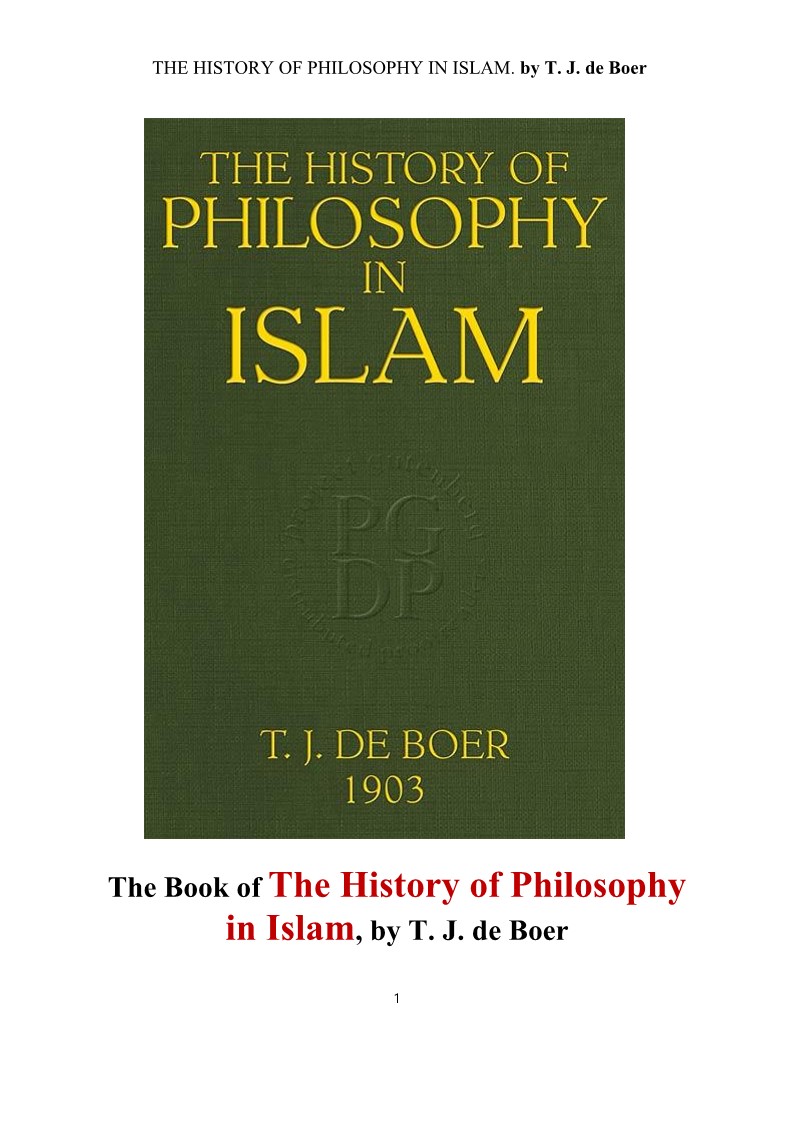이슬람세계의 문화에서의 철학의 역사이야기.THE HISTORY OF PHILOSOPHY IN ISLAM. by T. J. de Boer
CONTENTS.
CHAPTER I.
INTRODUCTION.
Page
1. The Theatre
1?6
1. Ancient Arabia
1
2. The first Caliphs. Medina. The Shi?ites
2
3. The Omayyads. Damascus, Basra and Kufa
3
4. The Abbasids. Bagdad
3
5. Minor States. Fall of the Caliphate
5
2. Oriental Wisdom
6?11
1. Semitic Speculation
6
2. Persian Religion. Zrwanism
8
3. Indian Wisdom
8
3. Greek Science
11?30
1. The Syrians
11
2. The Christian Churches
11
3. Edessa and Nisibis
12
4. Harran
13
5. Gondeshapur
14
6. Syriac Translations
14
7. Philosophy among the Syrians
16
8. Arabic Translations
17
9. The Philosophy of the Translators
19
10. Range of Tradition
21
11. Continuation of Neo-Platonism
22
12. The “Book of the Apple”
24
13. The “Theology of Aristotle”
25
14. Conception of Aristotle
27
15. Philosophy in Islam
28
[X]
CHAPTER II.
PHILOSOPHY AND ARAB KNOWLEDGE.
1. Grammatical Science
31?35
1. The several Sciences
31
2. The Arabic Language. The Koran
31
3. The Grammarians of Basra and Kufa
32
4. Grammar influenced by Logic. Metrical Studies
33
5. Grammatical Science and Philosophy
35
2. Ethical Teaching
36?41
1. Tradition and Individual Opinion (Sunna, Hadith, Ra?y)
36
2. Analogy (Qiyas). Consensus of the Congregation (Idjma)
37
3. Position and Contents of the Muslim Ethical System (al-Fiqh)
38
4. Ethics and Politics
40
3. Doctrinal Systems
41?64
1. Christian Dogmatic
41
2. The Kalam
42
3. The Mutazilites and their Opponents
43
4. Human and Divine Action
44
5. The Being of God
46
6. Revelation and Reason
48
7. Abu-l-Hudhail
49
8. Nazzam
51
9. Djahiz
53
10. Muammar and Abu Hashim
54
11. Ashari
55
12. The Atomistic Kalam
57
13. Mysticism or Sufism
62
4. Literature and History
65?71
1. Literature
65
2. Abu-l-Atahia. Mutanabbi. Abu-l-Ala. Hariri
65
3. Annalistic. Historical Tradition
67
4. Masudi and Muqaddasi
69
CHAPTER III.
THE PYTHAGOREAN PHILOSOPHY.
1. Natural Philosophy [XI]
72?80
1. The
도서소개
저자소개
목차소개





